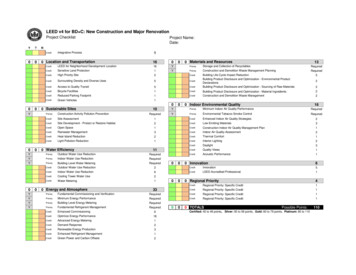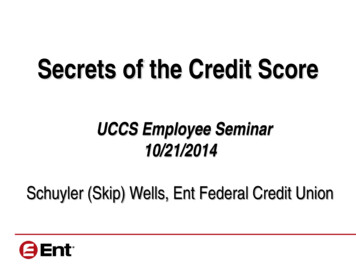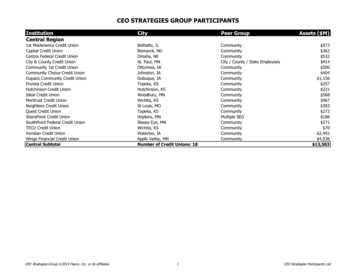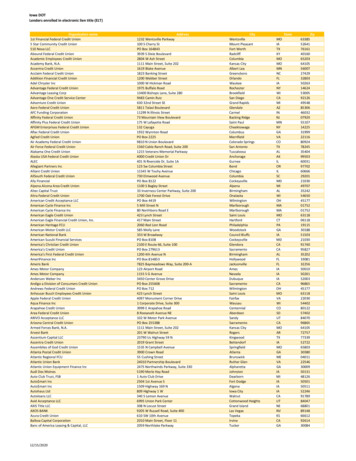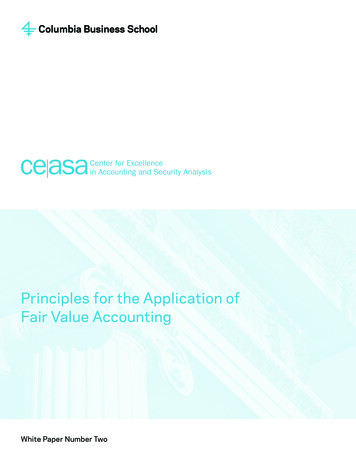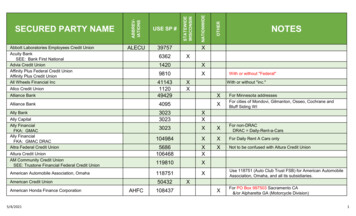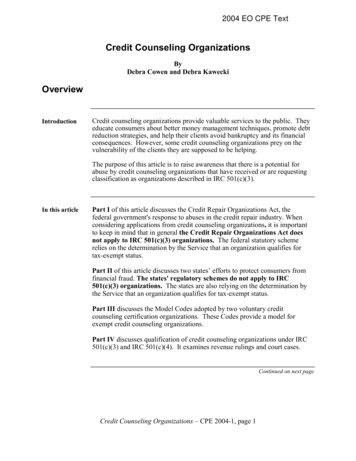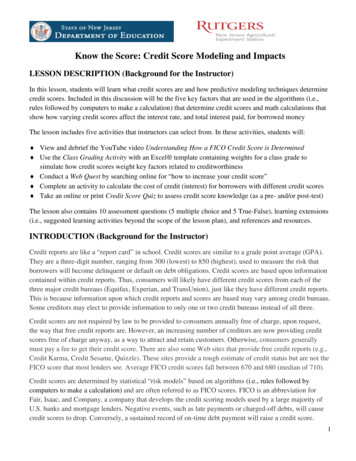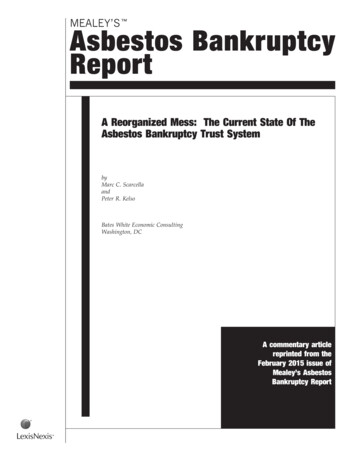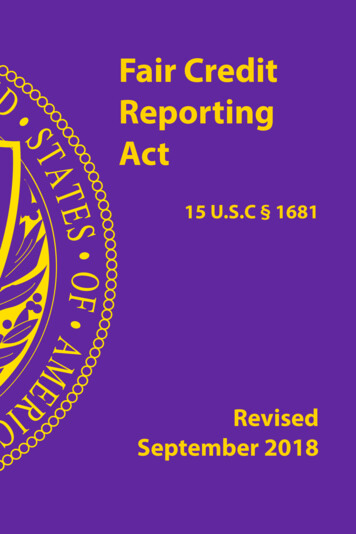
Transcription
Fair CreditReportingAct15 U.S.C § 1681RevisedSeptember 2018
As a public service, the staff of the Federal Trade Commission (FTC) hasprepared the following complete text of the Fair Credit Reporting Act(FCRA), 15 U.S.C. § 1681 et seq. Although staff generallyfollowed the format of the U.S. Code as published by the Government PrintingOffice, the format of this text does differ in minor ways from the Code (andfrom West’s U.S. Code Annotated). For example, this version uses FCRAsection numbers (§§ 601-629) in the headings. (The relevant U.S. Code citationis included with each section heading and each reference to the FCRA in thetext.) Although the staff has made every effort to transcribe the statutorymaterial accurately, this compendium is intended only as a convenience for thepublic and not a substitute for the text in the U.S. Code.This version of the FCRA includes the amendments to the FCRA set forth inthe Consumer Credit Reporting Reform Act of 1996 (Public Law 104-208, theOmnibus Consolidated Appropriations Act for Fiscal Year 1997, Title II,Subtitle D, Chapter 1), Section 311 of the Intelligence Authorization for FiscalYear 1998 (Public Law 105-107), the Consumer Reporting EmploymentClarification Act of 1998 (Public Law 105-347), Section 506 of the GrammLeach-Bliley Act (Public Law 106-102), Sections 358(g) and 505(c) of theUniting and Strengthening America by Providing Appropriate Tools Requiredto Intercept and Obstruct Terrorism Act of 2001 (USA PATRIOT Act) (PublicLaw 107-56), the Fair and Accurate Credit Transactions Act of 2003 (FACTAct) (Public Law 108-159), Section 719 of the Financial Services RegulatoryRelief Act of 2006 (Public Law 109-351), Section 743 (Div. D, Title VII) ofthe Consolidated Appropriations Act of 2008 (Public Law 110-161), the Creditand Debit Card Receipt Clarification Act of 2007 (Public Law 110-241), andSections 205 and 302 of the Credit Card Accountability Responsibility andDisclosure (CARD) Act of 2009 (Public Law 111-24), the Consumer FinancialProtection Act of 2010 (CFPA) (Title X of the Dodd-Frank Wall Street Reformand Consumer Protection Act, Public Law 111-203), and the Red Flag ProgramClarification Act of 2010 (Public Law 111-203), and Sections 301, 302, and602 of the Economic Growth, Regulatory Relief, and Consumer ProtectionAct (Public Law 115-174). The Commission website posted this document onSeptember 1, 2011.The provisions added to the FCRA by the FACT Act became effective atdifferent times. In some cases, the provision includes its own effective date. Inother cases, the FACT Act provides that the effective dates be prescribed by theFTC and Federal Reserve Board. See 16 CFR Part 602 (69 Fed. Reg. 6526;February 11, 2004) (69 Fed. Reg. 29061; May 20, 2004).The provisions added to the FCRA by the CFPA became effective on July 21,2011, the “designated transfer date” on which the Bureau of Consumer FinancialProtection assumed certain duties specified by the CFPA. See 75 Fed. Reg.57252 (Sept. 20, 2010).
Contents§ 601.§ 602.§ 603.§ 604.§ 605.Short title . . . . . . . . . . . . . . . . . . . . . . . . . . . . . . . . . . . . . . . . . . . . 1Congressional findings and statement of purpose [15 U.S.C. § 1681] . . . . . . 1Definitions; rules of construction [15 U.S.C. § 1681a] . . . . . . . . . . . . . . . 1Permissible purposes of consumer reports [15 U.S.C. § 1681b] . . . . . . . . . 11Requirements relating to information contained in consumer reports[15 U.S.C. § 1681c] . . . . . . . . . . . . . . . . . . . . . . . . . . . . . . . . . . . . 22§ 605A. Identity theft prevention; fraud alerts and active duty alerts[15 U.S.C. § 1681c-1] . . . . . . . . . . . . . . . . . . . . . . . . . . . . . . . . . . . 26§ 605B. Block of information resulting from identity theft [15 U.S.C. § 1681c-2] . . . 39§ 606. Disclosure of investigative consumer reports [15 U.S.C. § 1681d] . . . . . . . 41§ 607. Compliance procedures [15 U.S.C. § 1681e] . . . . . . . . . . . . . . . . . . . . . 43§ 608. Disclosures to governmental agencies [15 U.S.C. § 1681f] . . . . . . . . . . . . 45§ 609. Disclosures to consumers [15 U.S.C. § 1681g] . . . . . . . . . . . . . . . . . . . 45§ 610. Conditions and form of disclosure to consumers [15 U.S.C. § 1681h] . . . . . 57§ 611. Procedure in case of disputed accuracy [15 U.S.C. § 1681i] . . . . . . . . . . . 58§ 612. Charges for certain disclosures [15 U.S.C. § 1681j] . . . . . . . . . . . . . . . . 66§ 613. Public record information for employment purposes [15 U.S.C. § 1681k] . . 70§ 614. Restrictions on investigative consumer reports [15 U.S.C. § 1681l] . . . . . . 70§ 615. Requirements on users of consumer reports [15 U.S.C. § 1681m] . . . . . . 70§ 616. Civil liability for willful noncompliance [15 U.S.C. § 1681n] . . . . . . . . . . 79§ 617. Civil liability for negligent noncompliance [15 U.S.C. § 1681o] . . . . . . . . 80§ 618. Jurisdiction of courts; limitation of actions [15 U.S.C. § 1681p] . . . . . . . . 80§ 619. Obtaining information under false pretenses [15 U.S.C. § 1681q] . . . . . . . 81§ 620. Unauthorized disclosures by officers or employees [15 U.S.C. § 1681r] . . . 81§ 621. Administrative enforcement [15 U.S.C. § 1681s] . . . . . . . . . . . . . . . . . . 81§ 622. Information on overdue child support obligations [15 U.S.C. § 1681s-1] . . 87§ 623. Responsibilities of furnishers of information to consumer reportingagencies [15 U.S.C. § 1681s-2] . . . . . . . . . . . . . . . . . . . . . . . . . . . . . 87§ 624. Affiliate sharing [15 U.S.C. § 1681s-3] . . . . . . . . . . . . . . . . . . . . . . . . 97§ 625. Relation to State laws [15 U.S.C. § 1681t] . . . . . . . . . . . . . . . . . . . . . 100§ 626. Disclosures to FBI for counterintelligence purposes [15 U.S.C. § 1681u] . 103§ 627. Disclosures to governmental agencies for counterterrorism purposes[15 U.S.C. § 1681v] . . . . . . . . . . . . . . . . . . . . . . . . . . . . . . . . . . . 108§ 628. Disposal of records [15 U.S.C. § 1681w] . . . . . . . . . . . . . . . . . . . . . 109§ 629. Corporate and technological circumvention prohibited[15 U.S.C. § 1681x] . . . . . . . . . . . . . . . . . . . . . . . . . . . . . . . . . . . 110
§ 603 - 15 U.S.C. § 1681a§ 601. Short titleThis title may be cited as the “Fair Credit Reporting Act.”§ 602. Congressional findings and statement of purpose[15 U.S.C. § 1681](a)Accuracy and fairness of credit reporting. The Congress makes thefollowing findings:(1) The banking system is dependent upon fair and accurate creditreporting. Inaccurate credit reports directly impair the efficiency ofthe banking system, and unfair credit reporting methods underminethe public confidence which is essential to the continued functioningof the banking system.(2) An elaborate mechanism has been developed for investigating andevaluating the credit worthiness, credit standing, credit capacity,character, and general reputation of consumers.(3) Consumer reporting agencies have assumed a vital role in assemblingand evaluating consumer credit and other information on consumers.(4) There is a need to insure that consumer reporting agencies exercisetheir grave responsibilities with fairness, impartiality, and a respectfor the consumer’s right to privacy.(b)Reasonable procedures. It is the purpose of this title to require thatconsumer reporting agencies adopt reasonable procedures for meeting theneeds of commerce for consumer credit, personnel, insurance, and otherinformation in a manner which is fair and equitable to the consumer, withregard to the confidentiality, accuracy, relevancy, and proper utilization ofsuch information in accordance with the requirements of this title.§ 603. Definitions; rules of construction [15 U.S.C. § 1681a](a)Definitions and rules of construction set forth in this section are applicablefor the purposes of this title.(b)The term “person” means any individual, partnership, corporation, trust,estate, cooperative, association, government or governmental subdivisionor agency, or other entity.(c)The term “consumer” means an individual.(d)Consumer Report(1) In general. The term “consumer report” means any written, oral,or other communication of any information by a consumer reportingagency bearing on a consumer’s credit worthiness, credit standing,1
§ 603 - 15 U.S.C. § 1681acredit capacity, character, general reputation, personal characteristics,or mode of living which is used or expected to be used or collected inwhole or in part for the purpose of serving as a factor in establishingthe consumer’s eligibility for(A) credit or insurance to be used primarily for personal, family, orhousehold purposes;(B)employment purposes; or(C)any other purpose authorized under section 604 [§ 1681b].(2) Exclusions. Except as provided in paragraph (3), the term “consumerreport” does not include(A) subject to section 624, any(i)report containing information solely as to transactions orexperiences between the consumer and the person makingthe report;(ii) communication of that information among persons relatedby common ownership or affiliated by corporate control;or(iii) communication of other information among personsrelated by common ownership or affiliated by corporatecontrol, if it is clearly and conspicuously disclosed tothe consumer that the information may be communicatedamong such persons and the consumer is given theopportunity, before the time that the information is initiallycommunicated, to direct that such information not becommunicated among such persons;(B)any authorization or approval of a specific extension of creditdirectly or indirectly by the issuer of a credit card or similardevice;(C)any report in which a person who has been requested by a thirdparty to make a specific extension of credit directly or indirectlyto a consumer conveys his or her decision with respect to suchrequest, if the third party advises the consumer of the name andaddress of the person to whom the request was made, and suchperson makes the disclosures to the consumer required undersection 615 [§ 1681m]; or(D) a communication described in subsection (o) or (x).11 Should be read as “(o) or (y)” because section 603(x) was re-designated as 603(y) in 2010 by the CFPA.2
§ 603 - 15 U.S.C. § 1681a(3) Restriction on sharing of medical information. Except for informationor any communication of information disclosed as provided in section604(g)(3), the exclusions in paragraph (2) shall not apply with respectto information disclosed to any person related by common ownershipor affiliated by corporate control, if the information is –(A) medical information;(B)an individualized list or description based on the paymenttransactions of the consumer for medical products or services; or(C)an aggregate list of identified consumers based on paymenttransactions for medical products or services.(e)The term “investigative consumer report” means a consumer report orportion thereof in which information on a consumer’s character, generalreputation, personal characteristics, or mode of living is obtained throughpersonal interviews with neighbors, friends, or associates of the consumerreported on or with others with whom he is acquainted or who may haveknowledge concerning any such items of information. However, suchinformation shall not include specific factual information on a consumer’scredit record obtained directly from a creditor of the consumer or from aconsumer reporting agency when such information was obtained directlyfrom a creditor of the consumer or from the consumer.(f)The term “consumer reporting agency” means any person which, formonetary fees, dues, or on a cooperative nonprofit basis, regularly engagesin whole or in part in the practice of assembling or evaluating consumercredit information or other information on consumers for the purpose offurnishing consumer reports to third parties, and which uses any means orfacility of interstate commerce for the purpose of preparing or furnishingconsumer reports.(g)The term “file,” when used in connection with information on anyconsumer, means all of the information on that consumer recorded andretained by a consumer reporting agency regardless of how the informationis stored.(h)The term “employment purposes” when used in connection with aconsumer report means a report used for the purpose of evaluating aconsumer for employment, promotion, reassignment or retention as anemployee.(i)The term “medical information” –(1) means information or data, whether oral or recorded, in any formor medium, created by or derived from a health care provider or theconsumer, that relates to –3
§ 603 - 15 U.S.C. § 1681a(A) the past, present, or future physical, mental, or behavioralhealth or condition of an individual;(B)the provision of health care to an individual; or(C)the payment for the provision of health care to an individual.(2) does not include the age or gender of a consumer, demographicinformation about the consumer, including a consumer’s residenceaddress or e-mail address, or any other information about a consumerthat does not relate to the physical, mental, or behavioral health orcondition of a consumer, including the existence or value of anyinsurance policy.(j)Definitions Relating to Child Support Obligations(1) The “overdue support” has the meaning given to such term in section666(e) of title 42 [Social Security Act, 42 U.S.C. § 666(e)].(2) The term “State or local child support enforcement agency” means aState or local agency which administers a State or local program forestablishing and enforcing child support obligations.(k)Adverse Action(1) Actions included. The term “adverse action” –(A) has the same meaning as in section 701(d)(6) of the EqualCredit Opportunity Act; and(B)means(i)a denial or cancellation of, an increase in any charge for,or a reduction or other adverse or unfavorable change inthe terms of coverage or amount of, any insurance,existing or applied for, in connection with the underwritingof insurance;(ii) a denial of employment or any other decision foremployment purposes that adversely affects any current orprospective employee;(iii) a denial or cancellation of, an increase in any charge for,or any other adverse or unfavorable change in the termsof, any license or benefit described in section 604(a)(3)(D)[§ 1681b]; and(iv) an action taken or determination that is(I) made in connection with an application that was madeby, or a transaction that was initiated by, any4
§ 603 - 15 U.S.C. § 1681aconsumer, or in connection with a review of anaccount under section 604(a)(3)(F)(ii)[§ 1681b]; and(II) adverse to the interests of the consumer.(2) Applicable findings, decisions, commentary, and orders. For purposesof any determination of whether an action is an adverse action underparagraph (1)(A), all appropriate final findings, decisions, commentary,and orders issued under section 701(d)(6) of the Equal CreditOpportunity Act by the Bureau or any court shall apply.(l)The term “firm offer of credit or insurance” means any offer of credit orinsurance to a consumer that will be honored if the consumer isdetermined, based on information in a consumer report on the consumer,to meet the specific criteria used to select the consumer for the offer,except that the offer may be further conditioned on one or more of thefollowing:(1) The consumer being determined, based on information in theconsumer’s application for the credit or insurance, to meet specificcriteria bearing on credit worthiness or insurability, as applicable,that are established(A) before selection of the consumer for the offer; and(B)for the purpose of determining whether to extend credit orinsurance pursuant to the offer.(2) Verification(A) that the consumer continues to meet the specific criteria usedto select the consumer for the offer, by using information in aconsumer report on the consumer, information in the consumer’sapplication for the credit or insurance, or other informationbearing on the credit worthiness or insurability of theconsumer; or(B)of the information in the consumer’s application for the creditor insurance, to determine that the consumer meets the specificcriteria bearing on credit worthiness or insurability.(3) The consumer furnishing any collateral that is a requirement for theextension of the credit or insurance that was(A) established before selection of the consumer for the offer ofcredit or insurance; and(B)disclosed to the consumer in the offer of credit or insurance.5
§ 603 - 15 U.S.C. § 1681a(m) The term “credit or insurance transaction that is not initiated by theconsumer” does not include the use of a consumer report by a person withwhich the consumer has an account or insurance policy, for purposes of(1) reviewing the account or insurance policy; or(2) collecting the account.(n)The term “State” means any State, the Commonwealth of Puerto Rico, theDistrict of Columbia, and any territory or possession of the United States.(o)Excluded communications. A communication is described in thissubsection if it is a communication(1) that, but for subsection (d)(2)(D), would be an investigativeconsumer report;(2) that is made to a prospective employer for the purpose of(A) procuring an employee for the employer; or(B)procuring an opportunity for a natural person to work for theemployer;(3) that is made by a person who regularly performs such procurement;(4) that is not used by any person for any purpose other than a purposedescribed in subparagraph (A) or (B) of paragraph (2); and(5) with respect to which(A) the consumer who is the subject of the communication(i)consents orally or in writing to the nature and scope of thecommunication, before the collection of any informationfor the purpose of making the communication;(ii) consents orally or in writing to the making of thecommunication to a prospective employer, before themaking of the communication; and(iii) in the case of consent under clause (i) or (ii) given orally,is provided written confirmation of that consent by theperson making the communication, not later than 3 businessdays after the receipt of the consent by that person;(B)the person who makes the communication does not, for thepurpose of making the communication, make any inquiry thatif made by a prospective employer of the consumer who is thesubject of the communication would violate any applicableFederal or State equal employment opportunity law orregulation; and6
§ 603 - 15 U.S.C. § 1681a(C)the person who makes the communication(i)discloses in writing to the consumer who is the subject ofthe communication, not later than 5 business days afterreceiving any request from the consumer for suchdisclosure, the nature and substance of all information inthe consumer’s file at the time of the request, except thatthe sources of any information that is acquired solely foruse in making the communication and is actually used forno other purpose, need not be disclosed other than underappropriate discovery procedures in any court of competentjurisdiction in which an action is brought; and(ii) notifies the consumer who is the subject of thecommunication, in writing, of the consumer’s right torequest the information described in clause (i).(p)The term “consumer reporting agency that compiles and maintains files onconsumers on a nationwide basis” means a consumer reporting agency thatregularly engages in the practice of assembling or evaluating, andmaintaining, for the purpose of furnishing consumer reports to third partiesbearing on a consumer’s credit worthiness, credit standing, or creditcapacity, each of the following regarding consumers residing nationwide:(1) Public record information.(2) Credit account information from persons who furnish thatinformation regularly and in the ordinary course of business.(q)Definitions relating to fraud alerts.(1) The term “active duty military consumer” means a consumer inmilitary service who –(A) is on active duty (as defined in section 101(d)(1) of title 10,United States Code) or is a reservist performing duty under acall or order to active duty under a provision of law referred toin section 101(a)(13) of title 10, United States Code; and(B)is assigned to service away from the usual duty station of theconsumer.(2) The terms “fraud alert” and “active duty alert” mean a statement inthe file of a consumer that –(A) notifies all prospective users of a consumer report relating tothe consumer that the consumer may be a victim of fraud,including identity theft, or is an active duty military consumer,as applicable; and7
§ 603 - 15 U.S.C. § 1681a(B)is presented in a manner that facilitates a clear and conspicuousview of the statement described in subparagraph (A) by anyperson requesting such consumer report.(3) The term “identity theft” means a fraud committed using theidentifying information of another person, subject to such furtherdefinition as the Bureau may prescribe, by regulation.See also 16 CFR Part 603.269 Fed. Reg. 63922 (11/03/04)(4) The term “identity theft report” has the meaning given that term byrule of the Bureau, and means, at a minimum, a report –See also 16 CFR Part 603.369 Fed. Reg. 63922 (11/03/04)(A) that alleges an identity theft;(B)that is a copy of an official, valid report filed by a consumerwith an appropriate Federal, State, or local law enforcementagency, including the United States Postal Inspection Service,or such other government agency deemed appropriate by theBureau; and(C)the filing of which subjects the person filing the report tocriminal penalties relating to the filing of false information if,in fact, the information in the report is false.(5) The term “new credit plan” means a new account under an open endcredit plan (as defined in section 103(i) of the Truth in Lending Act)or a new credit transaction not under an open end credit plan.(r)Credit and Debit Related Terms(1) The term “card issuer” means –(A) a credit card issuer, in the case of a credit card; and(B)a debit card issuer, in the case of a debit card.(2) The term “credit card” has the same meaning as in section 103 of theTruth in Lending Act.(3) The term “debit card” means any card issued by a financial institutionto a consumer for use in initiating an electronic fund transfer fromthe account of the consumer at such financial institution, for thepurpose of transferring money between accounts or obtaining money,property, labor, or services.(4) The terms “account” and “electronic fund transfer” have the samemeanings as in section 903 of the Electronic Fund Transfer Act.8
§ 603 - 15 U.S.C. § 1681a(5) The terms “credit” and “creditor” have the same meanings as insection 702 of the Equal Credit Opportunity Act.(s)The term “Federal banking agency” has the same meaning as in section 3of the Federal Deposit Insurance Act.(t)The term “financial institution” means a State or National bank, a Stateor Federal savings and loan association, a mutual savings bank, a State orFederal credit union, or any other person that, directly or indirectly, holdsa transaction account (as defined in section 19(b) of the Federal ReserveAct) belonging to a consumer.(u)The term “reseller” means a consumer reporting agency that –(1) assembles and merges information contained in the database ofanother consumer reporting agency or multiple consumer reportingagencies concerning any consumer for purposes of furnishing suchinformation to any third party, to the extent of such activities; and(2) does not maintain a database of the assembled or merged informationfrom which new consumer reports are produced.(v)The term “Commission” means the Federal Trade Commission.(w) The term “Bureau” means the Bureau of Consumer Financial Protection.(x)The term “nationwide specialty consumer reporting agency” means aconsumer reporting agency that compiles and maintains files on consumerson a nationwide basis relating to –(1) medical records or payments;(2) residential or tenant history;(3) check writing history;(4) employment history; or(5) insurance claims.(y)Exclusion of Certain Communications for Employee Investigations(1) A communication is described in this subsection if –(A) but for subsection (d)(2)(D), the communication would be aconsumer report;(B)the communication is made to an employer in connection withan investigation of –(i)suspected misconduct relating to employment; or9
§ 603 - 15 U.S.C. § 1681a(ii) compliance with Federal, State, or local laws andregulations, the rules of a self-regulatory organization,or any preexisting written policies of the employer;(C)the communication is not made for the purpose of investigatinga consumer’s credit worthiness, credit standing, or creditcapacity; and(D) the communication is not provided to any person except –(i)to the employer or an agent of the employer;(ii) to any Federal or State officer, agency, or department,or any officer, agency, or department of a unit of generallocal government;(iii) to any self-regulatory organization with regulatoryauthority over the activities of the employer or employee;(iv) as otherwise required by law; or(v)pursuant to section 608.(2) Subsequent disclosure. After taking any adverse action based inwhole or in part on a communication described in paragraph (1), theemployer shall disclose to the consumer a summary containing thenature and substance of the communication upon which the adverseaction is based, except that the sources of information acquired solelyfor use in preparing what would be but for subsection (d)(2)(D) aninvestigative consumer report need not be disclosed.(3) For purposes of this subsection, the term “self-regulatory organization”includes any self-regulatory organization (as defined in section 3(a)(26) of the Securities Exchange Act of 1934), any entity establishedunder title I of the Sarbanes-Oxley Act of 2002, any board of tradedesignated by the Commodity Futures Trading Commission, and anyfutures association registered with such Commission.(z)Veteran. The term ‘veteran’ has the meaning given the term in section101 of title 38, United States Code.(aa) Veteran’s medical debt. The term ‘veteran’s medical debt’(1) means a medical collection debt of a veteran owed to a non-Departmentof Veterans Affairs health care provider that was submitted to theDepartment for payment for health care authorized by theDepartment of Veterans Affairs; and(2) includes medical collection debt that the Department of VeteransAffairs has wrongfully charged a veteran.10
§ 604 - 15 U.S.C. § 1681b§ 604. Permissible purposes of consumer reports[15 U.S.C. § 1681b](a)In general. Subject to subsection (c), any consumer reporting agency mayfurnish a consumer report under the following circumstances and no other:(1) In response to the order of a court having jurisdiction to issue such anorder, or a subpoena issued in connection with proceedings before aFederal grand jury.(2) In accordance with the written instructions of the consumer to whomit relates.(3) To a person which it has reason to believe(A) intends to use the information in connection with a credittransaction involving the consumer on whom the informationis to be furnished and involving the extension of credit to, orreview or collection of an account of, the consumer; or(B)intends to use the information for employment purposes; or(C)intends to use the information in connection with theunderwriting of insurance involving the consumer; or(D) intends to use the information in connection with a determinationof the consumer’s eligibility for a license or other benefitgranted by a governmental instrumentality required by law toconsider an applicant’s financial responsibility or status; or(E)intends to use the information, as a potential investor orservicer, or current insurer, in connection with a valuation of,or an assessment of the credit or prepayment risks associatedwith, an existing credit obligation; or(F)otherwise has a legitimate business need for the information(i)in connection with a business transaction that is initiatedby the consumer; or(ii) to review an account to determine whether the consumercontinues to meet the terms of the account.2(G) executive departments and agencies in connection with theissuance of government-sponsored individually-billed travelcharge cards. 22 As written in the 2007 amendment that added section 604(a)(3)(G). Subsection F(ii) should end with “;or” instead of a period, and the text of subsection (g) should conform to the style of the rest of section605(a)(3).11
§ 604 - 15 U.S.C. § 1681b(4) In response to a request by the head of a State or local child supportenforcement agency (or a State or local government officialauthorized by the head of such an agency), if the person making therequest certifies to the consumer reporting agency that –(A) the consumer report is needed for the purpose of establishing anindividual’s capacity to make child support payments, determiningthe appropriate level of such payments, or enforcing a childsupport order, award, agreement, or judgment;(B)the parentage of the consumer for the child to which theobligation relates has been established or acknowledged by theconsumer in accordance with State laws under which theobligation arises (if required by those laws); and(C)the consumer report will be kept confidential, will be usedsolely for a purpose described in subparagraph (A), and willnot be used in connection with any other civil, administrative,or criminal proceeding, or for any other purpose.(D) Redesignated (C)(5) To an agency administering a State plan under Section 454 of theSocial Security Act (42 U.S.C. § 654) for use to set an initial ormodified child support award.(6) To the Federal Deposit Insurance Corporation or the National CreditUnion Administration as part of its preparation for its appointment oras part of its exercise of powers, as conservator, receiver, orliquidating agent for an insured depository institution or insuredcredit union under the Federal Deposit Insurance Act or the FederalCredit Union Act, or other applicable Federal or State
Sep 01, 2011 · prepared the following complete text of the Fair Credit Reporting Act (FCRA), 15 U.S.C. § 1681 et seq. Although staff generally followed the format of the U.S. Code as published by the Government Printing Office, the format of this text does differ in minor
